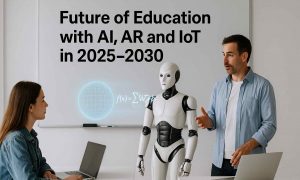

1. Global AI in Education Market Analysis (MarketResearch.com)
This comprehensive report covers a wide range of components, including solutions and services, with a deep dive into deployment modes like cloud and on-premises. Notably, it highlights significant growth in the Asia-Pacific region, emphasizing China’s major contributions to market expansion. The growing adoption of AI in education in China is evidenced by initiatives like AI-driven adaptive learning platforms and smart classrooms. These innovations are revolutionizing traditional teaching methods and enhancing student engagement and learning outcomes.
Moreover, the report underscores the role of AI in addressing educational challenges such as access to quality education and personalized learning experiences. For example, AI-powered tutoring systems can provide students in remote or underserved areas with access to high-quality educational resources and personalized support tailored to their learning needs. This democratization of education through AI technologies has the potential to narrow the education gap and empower learners from diverse backgrounds.
2. AI in Education Sector Growth Opportunities (Frost & Sullivan)
Frost & Sullivan’s report focuses on market innovations and the strategic moves of leading players. It suggests a strong growth trajectory in the deployment of AI solutions in educational institutions across Europe, with an emphasis on personalized learning environments. For instance, AI-powered tutoring systems are gaining traction in European schools, offering personalized learning experiences tailored to individual student needs. These systems analyze student performance data to provide targeted interventions and support, ultimately improving learning outcomes.
Furthermore, the report highlights the integration of AI with other emerging technologies such as augmented reality (AR) and virtual reality (VR) to create immersive learning experiences. In Europe, educational institutions are exploring the use of AI-driven AR and VR applications to simulate real-world scenarios and facilitate hands-on learning in subjects like science, engineering, and healthcare. These interactive learning experiences not only engage students but also foster creativity, critical thinking, and problem-solving skills essential for success in the 21st-century workforce.
3. European AI in Education Market Forecast (PSMarketResearch.com)
This report details the technological components dominating the sector, such as Machine Learning and Natural Language Processing, and projects substantial growth in European countries like France and Italy. This growth is driven by governmental educational reforms and digitalization initiatives aimed at enhancing the quality and accessibility of education. For example, France’s ambitious AI in Education Strategy aims to integrate AI technologies into various aspects of the education system, from classroom teaching to administrative processes, fostering innovation and efficiency.
Additionally, the report highlights the emergence of AI-powered adaptive learning platforms that cater to diverse learning styles and preferences. In countries like Italy, educational institutions are leveraging AI algorithms to analyze students’ learning patterns and preferences, allowing educators to tailor instructional content and learning activities accordingly. This personalized approach to learning not only enhances student engagement but also improves learning outcomes by addressing individual learning needs and challenges.
4. Asia-Pacific AI in Education Market Outlook (Grand View Research)
Projected to grow significantly, this report points to a surge in demand for AI-driven educational platforms in countries like India and China. This growth is facilitated by increasing internet accessibility and governmental support in technology integration into education sectors. In India, initiatives like the National Education Policy 2020 emphasize the integration of technology, including AI, to promote inclusive and equitable education. As a result, AI-powered learning platforms are increasingly being adopted in Indian schools to personalize learning experiences and address diverse learning needs.
Furthermore, the report highlights the role of AI in addressing educational challenges unique to the Asia-Pacific region, such as language barriers and cultural diversity. In countries like China, AI-powered language learning applications are helping students improve their proficiency in English and other foreign languages through interactive lessons and personalized feedback. Similarly, AI-driven content localization tools are enabling educational content providers to adapt learning materials to suit the cultural preferences and linguistic nuances of diverse student populations across Asia.
5. UK AI in Education Market Trends (Technavio)
Technavio highlights the UK market’s inclination towards AI integration in curriculums and administrative operations. The report predicts a steady growth rate supported by the UK government’s funding in educational technology. In the UK, AI technologies are being utilized to streamline administrative processes in educational institutions, such as admissions, scheduling, and student support services. Additionally, AI-based learning platforms are being integrated into curriculums to enhance teaching effectiveness and student engagement, driving the demand for AI solutions in the education sector.
Moreover, the report underscores the potential of AI in fostering collaborative learning environments and enhancing social interaction among students. In the UK, AI-driven collaboration tools are facilitating peer-to-peer learning and group projects by providing students with virtual spaces to collaborate, share ideas, and co-create content. These collaborative learning platforms not only promote teamwork and communication skills but also encourage active participation and knowledge sharing, enriching the overall learning experience for students.
6. Education Technology Market in Europe (Grand View Research)
With a focus on EdTech, this report discusses the impact of digital platforms in education, noting the substantial market share held by business segments, including educational institutions and corporations, particularly in Germany and the UK. The adoption of AI-driven EdTech solutions is transforming traditional classroom settings into dynamic learning environments, where students can access personalized learning materials and receive real-time feedback. This shift towards digital learning platforms is driven by the need for flexible and adaptive learning experiences that cater to individual learning styles and preferences.
Furthermore, the report highlights the role of AI in promoting lifelong learning and professional development in Europe. In countries like Germany, AI-powered online learning platforms are enabling professionals to acquire new skills and competencies to stay competitive in the rapidly evolving job market. These platforms offer personalized learning pathways and micro-credentials tailored to individual career goals and learning objectives, empowering learners to upskill and reskill at their own pace and convenience.
7. AI-Driven Learning in Higher Education (Grand View Research)
This segment-specific analysis sheds light on the adoption of AI technologies in higher education, with a special focus on student information management and campus management solutions. In higher education institutions, AI-powered student information systems are revolutionizing administrative processes, enabling seamless data management and analysis. Moreover, AI-driven campus management solutions are optimizing resource allocation and enhancing campus safety and security through predictive analytics and real-time monitoring.
Additionally, the report highlights the role of AI in promoting inclusive and accessible higher education environments. In universities across Europe, AI-driven accessibility tools are assisting students with disabilities by providing alternative formats for course materials, facilitating navigation on campus, and offering personalized support services. These accessibility solutions not only ensure equal opportunities for all students but also contribute to a more diverse and inclusive learning community, enriching the overall educational experience for everyone.
8. K-12 Education Technology Insights (Grand View Research)
This report covers the global K-12 sector, with a significant portion of the market share attributed to North America. However, it also notes considerable growth potential in the Asia-Pacific region. In K-12 education, AI technologies are being leveraged to personalize learning experiences and support teachers in delivering targeted instruction. For example, AI-powered tutoring systems can provide students with individualized learning paths based on their strengths and weaknesses, while AI-driven assessment tools can provide educators with actionable insights into student progress and learning gaps.
Furthermore, the report underscores the role of AI in promoting digital literacy and computational thinking skills among K-12 students. In countries like Australia, AI-driven coding platforms are being integrated into the curriculum to teach students fundamental programming concepts and problem-solving skills. These platforms utilize gamification and interactive exercises to engage students in coding activities, fostering creativity, logical thinking, and collaboration in the classroom.
9. Robo-Advisor Market and AI Integration (Maximize Market Research)
Although focused on financial services, this report provides insights into how AI technologies, like robo-advisors, are applicable in educational finance management. Educational institutions are increasingly turning to AI-powered robo-advisors to optimize budget allocation, manage endowments, and streamline financial aid distribution. By automating routine financial tasks and leveraging predictive analytics, robo-advisors can help institutions make data-driven decisions and maximize resources for educational initiatives.
Moreover, the report highlights the potential of AI in promoting financial literacy and responsible financial management among students. In universities and colleges, AI-driven personal finance apps are empowering students to make informed financial decisions, such as budgeting, saving, and investing. These apps offer personalized financial advice and educational resources tailored to students’ financial goals and circumstances, helping them develop lifelong money management skills essential for financial well-being.
10. AI in Corporate Training and Development (Straights Research)
This report highlights the increasing use of AI in corporate education and training programs, particularly in Asia. It discusses the impact of AI on upskilling and reskilling initiatives in the corporate sector. In Asia, companies are adopting AI-powered learning platforms to deliver personalized training experiences tailored to employees’ skill levels and learning goals. These platforms leverage technologies like natural language processing and machine learning to provide adaptive learning pathways and real-time feedback, enhancing employee engagement and performance.
Furthermore, the report underscores the role of AI in promoting continuous learning and professional growth in the workplace. In industries like technology and finance, AI-driven learning platforms are enabling employees to stay updated on the latest industry trends, regulations, and best practices. By offering on-demand access to relevant learning resources and interactive training modules, these platforms empower employees to acquire new skills and knowledge needed to adapt to changing job roles and market dynamics.
Additional Insights
Each section elaborates on the specific applications of AI technologies in education, such as personalized learning, administrative automation, and data-driven decision-making. The adoption of AI is reshaping educational landscapes, making them more customized and responsive to student and institutional needs.
As technology continues to evolve, the role of AI in education is expected to expand, driving innovation and transforming traditional teaching and learning paradigms. With AI-enabled solutions becoming increasingly accessible and affordable, educational institutions worldwide are poised to leverage these technologies to enhance learning outcomes and prepare students for success in the digital age.
Sources For more detailed insights, you can visit the original sources:
- MarketResearch.com AI in Education Report
- Frost & Sullivan AI Market Analysis
- PSMarketResearch.com AI Trends
- Grand View Research
- Technavio Market Reports
- Maximize Market Research
- Straights Research
This comparative analysis offers a clear view of the AI in Education market trends and growth forecasts across the UK, Europe, and Asia, underscoring the pivotal role of technology in shaping future educational paradigms.











